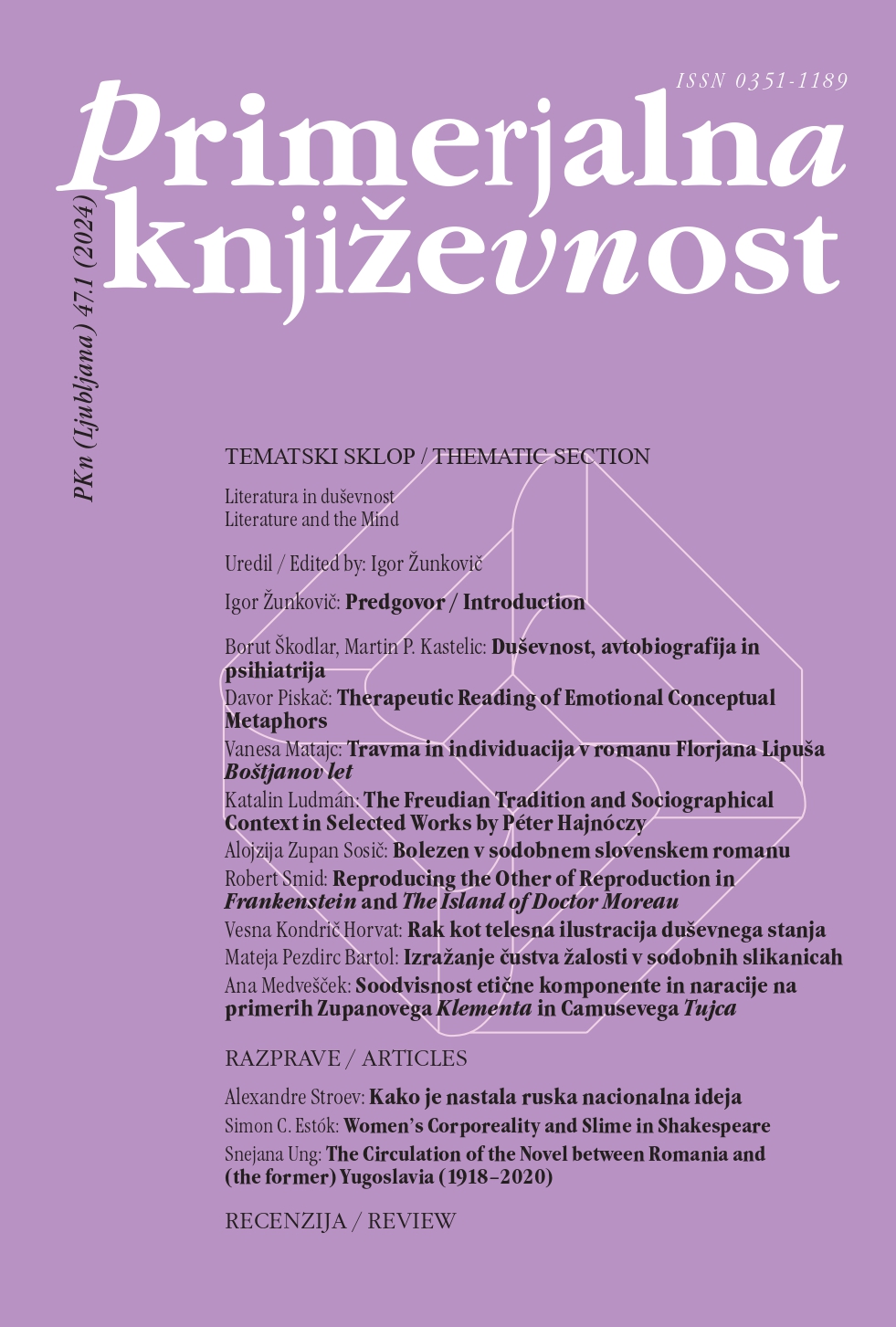Illness in a Contemporary Slovenian Novel
DOI:
https://doi.org/10.3986/pkn.v47.i1.05Keywords:
Slovenian literature, literary motifs, illness, social conditioning, Cankar, Ivan, Krese, Maruša, Kovač, Eva, Hrastelj, StankaAbstract
The second half of the twentieth century was a turning point for the wording of the disease in literature, as the disease—in addition to traditional dysfunctionality—was also attributed to social conditioning. If non-literary narrative is understood as a medical, philosophical or even lay account of illness, literary narrative is much more open in its definitions and ramified in different types and genres. The fundamental difference between them is the way trauma and stigma are represented: the literary treatment of both is based on several features, among which I focused on exciting tension, aestheticization, and self-reflection. The connection between two traumas, medical and social, is most evident in the novels The Ward of Mary Help of Christians by Ivan Cankar and Da me je strah? by Maruša Krese. Despite the different images and roles of the disease, the two novels share a common ethical motivation. The connection between ethical responsibility and disease in an empathic way is also similar in the novels Sonce zahaja v Celju by Eva Kovač and Igranje by Stanka Hrastelj, but they differ in that the first literaryizes two addictions, i.e. heroin and relationship, while the second focuses mainly on the stigmatization of schizophrenia. The polysemy of the disease in all four novels offers possibilities for the reader’s identification, and even more for literary empathy, with the help of which we “build” the foundations for accepting the disease and thus diversity in the world.
References
Adam, Philippe, in Claudine Herzlich. Sociologija bolezni in medicine. Prev. I. Radwan in J. Centa, Društvo pljučnih in alergijskih bolnikov Slovenije, 2002.
Andrieu, Bernard, in Gilles Boëtsch, ur. Rečnik tela. Prev. O. Stefanović, Službeni glasnik, 2010.
Avrahami, Einat. The Invading Body: Reading Illness Autobiographies. University of Virginia Press, 2007.
Bell, Ian. »Trainspotting by Irvine Welsh Review – Last Exit to Leith«. The Observer, 15. 8. 1993, https://www.theguardian.com/theobserver/1993/aug/15/featuresreview.review. Dostop 20. 12. 2023.
Cankar, Ivan. Hiša Marije Pomočnice, Mimo življenja. Zbrano delo, 11. knjiga, DZS, 1972.
Foster, Thomas C. How to Read Literature Like a Professor: A Lively and Entertaining Guide to Reading Between the Lines. Harper Perennial, 2014.
Furst, Lilian R. Idioms of Distress: Psychosomatic Disorders in Medical and Imaginative Literature. State University of New York Press, 2003.
Giroux, Élodie. »Bolezen«. Rečnik tela, ur. B. Andrieu in G. Boëtsch, prev. O. Stefanović, Službeni glasnik, 2010, str. 69–71.
Hrastelj, Stanka. Igranje. Mladinska knjiga, 2012.
Keen, Suzanne. »Introduction: Narrative and the Emotions«. Poetics Today, let. 32, št. 1, 2011, str. 1–53.
Keen, Suzanne. Narrative Form. Palgrave Macmillan / St. Martin Press, 2015.
Kovač, Eva. Sonce zahaja v Celju. Litera, 2014.
Kravitz, Bennett. Representations of Illness in Literature and Film. Cambridge Scholars Publishing, 2010.
Krese, Maruša. Da me je strah? Goga, 2013.
Nussbaum, Martha. Cultivating Humanity. Harvard University Press, 1997.
Rössler, Wulf. »The Stigma of Mental Disorders«. Embo Reports, let. 17, št. 9, 2016, str. 1250–1253.
Schönfelder, Christa. Wounds and Words: Childhood and Familiy Trauma in Romantic and Postmodern Fiction. Transcript Verlag, 2013.
Smyth, Adam, ur. A History of English Autobiography. Cambridge University Press, 2016.
Sontag, Susan. Pogled na bolečino drugega. Prev. Seta Knop, Sophia, 2006.
Svetek, Irena. »Poezija krute realnosti«. Eva Kovač, Sonce zahaja v Celju, Litera, 2014, str. 179–181.
»Svetovni dan knjige, 2020: literarni pogovor s pisateljico in pesnico Evo Kovač«. YouTube, naložil Gimnazija Celje – Center, 24. 4. 2020, https://www.youtube.com/watch?v=Dstuba5PKDQ.
Urban, Kenneth J. »Aids and Literature«. A Dictionary of Cultural and Critical Theory, ur. M. Payne, Blackwell Publishers, 1997, str. 21–22.
Zupan Sosič, Alojzija. »Avtobiografskost in Cankarjev roman Novo življenje«. Slavia Centralis, let. 15, št. 2, 2022, str. 143–160.
Zupan Sosič, Alojzija. Nekaj v megli nad reko ali literarna interpretacija (maturitetnih) besedil. Litera, 2022.
Zupan Sosič, Alojzija. »Osrednji simboli v Cankarjevem romanu Hiša Marije Pomočnice«. Jezik in slovstvo, let. 67, št. 1–2, 2022, str. 183–196.
Zupan Sosič, Alojzija. »Partizanska zgodba v sodobnem slovenskem romanu«. Jezik in slovstvo, let. 59, št. 1, 2014, str. 21–42.
Zupan Sosič, Alojzija. »Pripovedna empatija ter Cankarjeva romana Hiša Marije Pomočnice in Križ na gori«. Primerjalna književnost, let. 43, št. 1, 2020, str. 223–242.


